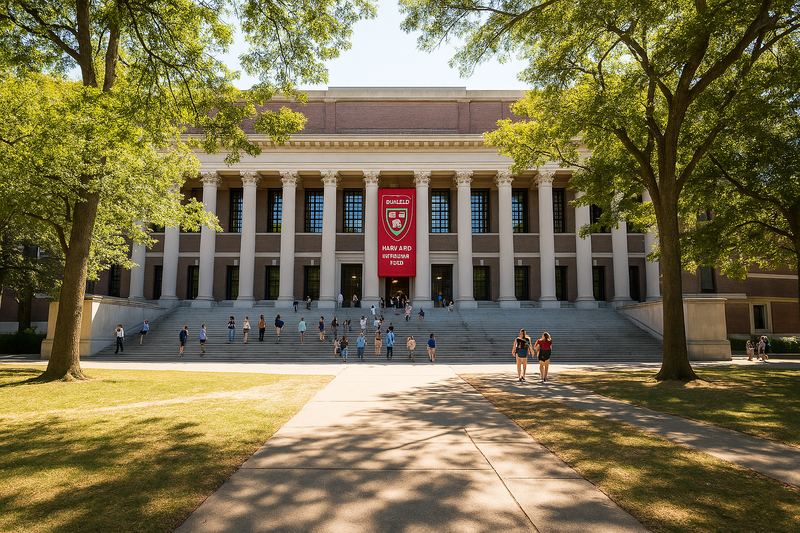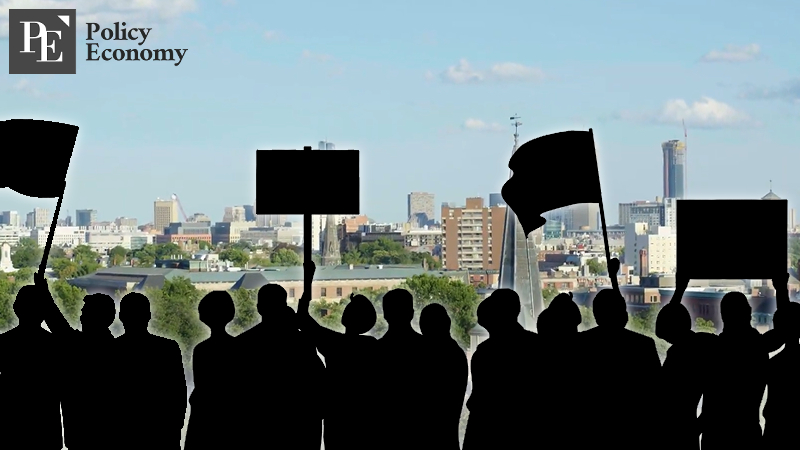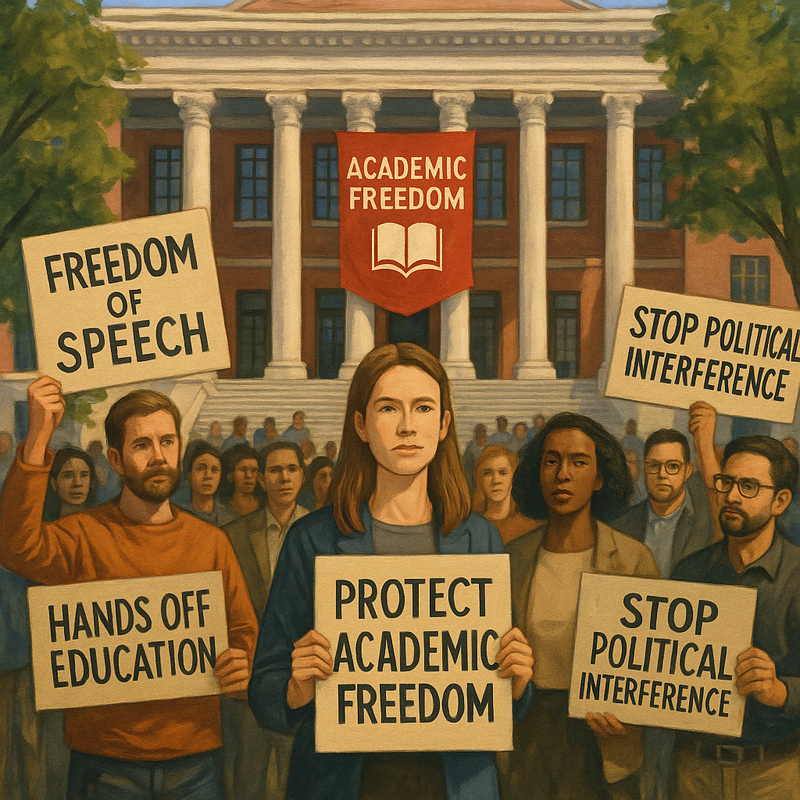Harvard in the Crosshairs: Trump’s Tax Threats and the New Academic Resistance
Input
Modified
The Cost of Noncompliance: Tax Status on the Line Harvard’s Defiance and the Ripple Across Academia A Battle for the Future of American Higher Education

In a dramatic escalation of his administration’s war on elite academia, President Donald Trump has threatened to strip Harvard University of its prized tax-exempt status, sparking fears of a political crackdown on academic independence and setting the stage for a constitutional showdown. The threat came just days after Harvard stunned the nation by rejecting more than $2.3 billion in federal funding to avoid complying with new ideological mandates tied to that funding.
Harvard’s decision to turn down the money—an unprecedented move in modern U.S. higher education—has not only thrown its financial and administrative future into uncharted territory but also marked a defiant stand for institutional autonomy. Now, the Trump administration appears poised to exact a much steeper price.
The Cost of Noncompliance: Tax Status on the Line
At a campaign-style rally in Cleveland, Ohio, on April 15, President Trump declared that Harvard had become “a sanctuary for Marxist radicals, subsidized by the American taxpayer.” He then went further: “If they don’t want to follow the rules, maybe they shouldn’t enjoy the benefits. We are looking very seriously at revoking their tax-exempt status—starting now.”
The comment, while delivered with Trump’s usual bravado, was far from rhetorical. Hours later, Education Secretary Don Wagner and Treasury Secretary Louisa Caine confirmed that a federal task force was reviewing the tax-exempt status of institutions deemed “non-compliant with national cultural transparency standards.” Harvard, they said, would be first on the list.
Such a move could expose the university’s vast endowment—valued at more than $50.7 billion—to taxation and subject its nonprofit operations to strict federal scrutiny. Legal experts say this would mark a radical departure from precedent and invite a barrage of litigation.
“This is an existential threat to the nonprofit model of higher education,” said Richard Beeman, a constitutional law professor at Georgetown University. “It’s not just about Harvard—it’s about the government redefining what counts as educational purpose, based on political content.”
The tension traces back to an executive order issued by Trump earlier this year, aimed at ending what he calls the “ideological monopoly” of liberal academic institutions. The order imposed new requirements on universities that accept federal funding:
Mandatory Political Content Audits – Universities must submit annual reports to the Department of Education detailing the ideological content of courses, research grants, and public statements made by faculty.
Viewpoint Diversity Certification – Institutions must ensure a “balance of political perspectives” in hiring, curricula, and public events.
DEI Freeze – Universities may not use federal funds for programs or positions linked to diversity, equity, and inclusion initiatives unless those programs are first approved by the Office of American Cultural Renewal, a newly established White House agency.
Compliance Contracts – Any university receiving more than $100 million annually from the federal government must sign a binding “academic neutrality agreement,” pledging not to “favor political ideologies in contradiction to American values.”
Harvard was given 45 days to comply. Instead, it walked away.

Harvard’s Defiance and the Ripple Across Academia
The university’s refusal—spearheaded by interim President Alan Garber and backed by Harvard’s powerful Corporation and Board of Overseers—was as swift as it was bold. “We cannot be coerced into compliance with ideologically driven mandates that undermine our mission,” Garber said in a public statement.
To cushion the blow, Harvard announced it would use its endowment to replace lost research and aid funding. A five-year plan reallocates approximately $500 million annually to maintain research, cover tuition shortfalls, and sustain international collaborations previously funded by agencies like the National Institutes of Health (NIH) and the National Science Foundation (NSF).
Despite internal concerns about the risks and trade-offs—especially in high-cost fields like public health and engineering—faculty and student support for the decision has remained strong.
“This is not just about money,” said Dr. Ilene Chung, a professor of global health at Harvard Medical School. “It’s about whether we retain the ability to pursue truth without political supervision.”
The financial cost, however, may soon go beyond lost federal grants. Trump’s tax-exemption threat targets the core of Harvard’s institutional model.
Under Section 501(c)(3) of the Internal Revenue Code, nonprofit educational institutions like Harvard benefit from massive tax privileges: they do not pay taxes on investment income, donations are tax-deductible for donors, and they avoid local property taxes on billions of dollars in real estate holdings. Losing that status would create an immediate tax liability of billions and dramatically hinder future fundraising.
Experts estimate that if Harvard were to lose its tax-exempt designation:
It could owe over $1 billion annually in new taxes on investment returns and endowment assets.
Donor contributions would decline, as wealthy benefactors would lose charitable deductions.
Real estate and facilities taxes could surge, costing the university an estimated $150 million annually in Cambridge and Boston alone.
In total, some analysts project a potential $6-8 billion hit over the next five years—a far greater blow than the loss of federal funding.
“This would be a financial earthquake,” said Claudia Simms, an education economist at the Brookings Institution. “Even for Harvard, this level of disruption would be deeply destabilizing.”
The legality of Trump’s move is hotly contested. The IRS typically requires that nonprofits engage primarily in educational and charitable purposes. Critics of Harvard claim its political activism disqualifies it. But legal scholars counter that academic freedom and political speech are protected under the First Amendment, and that the educational purpose of research and teaching remains central to the university’s mission.
“If the government starts deciding what’s ‘too political’ for education,” said Beeman, “we are on a very dangerous path.”
Lawsuits are already being drafted. Harvard’s legal team, bolstered by the ACLU and national academic coalitions, is expected to argue that revoking tax-exempt status over political disagreement violates the Constitution’s protections of speech, association, and due process.

A Battle for the Future of American Higher Education
In standing up to the administration, Harvard may have lit a fuse across the academic world. The symbolic weight of America’s oldest and wealthiest university saying “no” has emboldened other institutions to re-evaluate their own relationships with the federal government.
Since Harvard’s announcement, several universities—Yale, MIT, Stanford, the University of Chicago, and Columbia—have formed an “Academic Freedom Coalition,” pledging to resist “any federal encroachment on university governance or intellectual autonomy.”
Public universities, while more financially vulnerable, are also pushing back. The University of California system has launched an internal task force to explore legal avenues and alternative funding models.
Student-led protests have erupted at dozens of campuses, demanding that universities reject compliance with Trump’s ideological directives. Faculty senates are passing resolutions affirming the primacy of academic independence over federal dollars.
“There’s a shift in mood,” said Dr. Penelope Alvarez of UCLA. “For years, universities adapted quietly to political pressure. Harvard just proved that defiance is possible—and maybe necessary.”
At stake in this high-profile battle is not only money or prestige, but the very character of American education. Trump’s critics see his demands as part of a wider effort to reshape public institutions into vehicles for cultural and political control.
“What’s happening to Harvard could happen to any institution that tells the truth about climate, race, or history,” said Rep. Ayanna Pressley (D-MA). “We have to draw the line now, or it will be too late.”
Supporters of Trump argue that Harvard—and elite universities more broadly—have long been unaccountable, pushing liberal ideology while benefiting from public subsidies. “They made their choice,” said Sen. J.D. Vance (R-OH). “Now they live with the consequences.”
But Harvard’s defenders believe the university is showing the country what principled leadership looks like in an era of creeping authoritarianism. “They stood up when it counted,” said Dr. Robert Zimmerman, a Harvard alumnus and retired civil rights attorney. “And they reminded us that education isn’t supposed to be safe or obedient. It’s supposed to be free.”
As the legal and political showdown unfolds, Harvard now faces a future more uncertain than at any point in its nearly 400-year history. The university is bracing for budget shortfalls, donor backlash, and a long court battle. But it has also become the standard-bearer for a national resistance movement that is rapidly gaining momentum.
Whether Harvard’s gamble ultimately leads to victory or setback, one thing is clear: the age of quiet compliance in academia is over. In its place, a new era is dawning—one where universities are forced to choose between comfort and conscience, between state patronage and intellectual independence. And Harvard has made its choice.





















